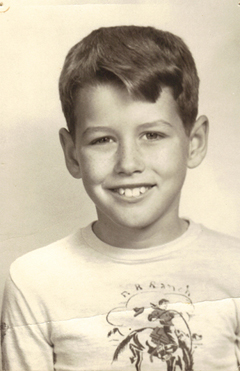At first, the attention and respect my words seemed to generate in the group members flattered me. And the humbling effects my confessions seemed to have on them humbled me. Still, it was very much against my intentions that the group’s perceptions should gradually displace my own, especially its perceptions of me. I resisted the: "I look at myself and ask: What do the others say is visible?"
The group’s leader emphasized the value of detachment in our relationships. I had reservations about the consequences of detachment for my art. I silently mocked the authenticity of the group’s glib ones who were almost always involuntaries - in the treatment program as a result of a court order. They were so self-possessed and articulate, even while skating on the edges of admitting any serious problems. I resisted them: "I am not like you. But if you are not like you either, then I am like you."
Less bothersome to me than the articulate involuntaries were the somnambulistic accepters, although the spiritual component of their acceptance seemed to make perfect psychological sense. If suffering is random and intrinsically not attributable to other things, the logic of deliverance from random suffering entails spirituality.
Involuntaries were often both boring and exasperating, being judgmental, childlike, and in denial. "(He is small who hides in order to show himself.)" And although I was in a sense an involuntary myself, I was also a voluntary and identified more with voluntaries and staff. However, I also perceived that involuntaries raised more interesting issues than voluntaries, challenging the latter’s commitment to the program, and I perceived that the involuntary part of me made more significant contributions to the group than my voluntary part. It is difficult to break this down because the transformation from primarily-individual to primarily-group identities is evidently a large part of the process for first-timers, and the group ethos encourages individual contributions from new members only for a while. Later, I sensed that the group’s involuntaries - who by their greater numbers and deeper commitment ultimately defined the group's ethos - concluded collectively that I’d run my string. They began to interrupt me regularly when I spoke out spontaneously.
It occurred to me that many of the recovering see the recovery process as providing, at last, a justification for their feeling superior to normies. Well, I believe the recovering are superior to normies, but the recovering are lucky to be that way, which is no grounds for self-congratulation. If no one is superior except by chance, there's no basis for treating others as inferiors.
The group provided me with a place to be away from where I was used to drinking, and at first I was mainly thankful to it for this simple thing. Later, I realized the group had reaffirmed my awareness that patience is critical in listening to someone talk about their struggles. Recently, the group taught me the even greater importance of patience in listening to someone using words to express false pride. May I keep this lesson with me away from the group.
I’m trying to remember the person who seemed to have affected his or her other group members most, as judged by the depth of emotions expressed when the person left. I think it was Perry, one person in the four-member group I joined originally. By the time Perry left, eight or ten sessions later, the group had grown to ten members.
What about Perry was so affecting? He always spoke very little and what he said was always directly to the point, sometimes almost poetically direct. He also wrote very little but his words always showed he had struggled with the issues or questions, and was giving us the struggle’s outcome. He never criticized others. He always sincerely tried to get the most out of the program, at times with a determination that seemed to come from doggedly not wanting to waste money. And yet, he always remained his own man - he smoked cigarettes in his car alone before the group started - and he never flinched in discussing his efforts to hide the drinking from everyone but us, or his old-fashioned guilt, or his drink-stalled dream of building a stock car in his garage, or anything else.
Whatever you were or did, group, "...in going I will leave a part of me with you. Because you changed me, and when you made me into another, I left you with me." (Italics mine)
**All quotations are from Voices, by Antonio Porchia.
(Written 2003, 2008)





